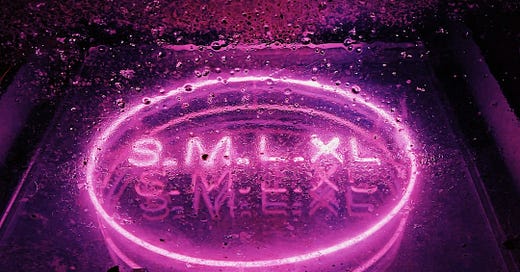My Bookish Community Observations on Diet Culture & Fat-Phobia
How diet culture and fat phobia make it into the books we read and write
Have you ever noticed how Western’s society obsession with thinness show up in fiction? I do, more often than I would like to. Being on the internet as long as I have been on it + coming from the fitstagram community, I notice.
Let’s talk about some of the observations I’ve made on how readers and writers alike continue to perpetuate the obsession with thinness, food, and body image.
If you thought that diet culture and fat-phobia only existed in magazines or TV, think again - It’s sneaking into our fiction books in unnoticeable ways
Often, we think of Diet Culture as IG influencers, Pinterest graphics, and magazines that tell us “do this to lose X in 10 days”, this may not be the way that diet culture and fat phobia are included in fiction. In many cases it is so subtle that even when we determine that a book has harmful stereotypes, diet culture and fat-phobia are seldomly included as part of those harmful topics.
The bookish community (readers and writers alike) should understand how implicitly or explicitly weaving diet culture into the characters, plot, book themes can wholly change how we consider storytelling.
Let’s back up a bit, What is Diet Culture And Fat-Phobia Come From?
Based on some additional research I did to put this together, we have to go back in time some. All the way back to the 1400s, when the slave trade was introduced in Europe. There is evidence that with the introduction of African slaves to the European country, some Europeans “scholars” took it upon themselves to start asking themselves “What makes a woman beautiful?” You know where this is going.
BOOK Recommendation to learn more about the origins of Diet Culture and Fat Phobia: Fearing the Black Body The Racial Origins of Fat Phobia (This is a history book, reads like a text book, highly recommended for the historical context and facts. I found it on Libby.)
As time passed beauty standards changed, and we landed on the belief that being thin is associated with better health, higher success, attractiveness — and morally good. Culturally, especially in Western countries, where we continue to celebrate weight loss and tie people’s value to their body type or straight up project their fear of being fat onto other people. Don’t lie to yourself, you’ve thought so too. That is just what we all have been exposed to. It is everywhere.
Even literature.
What I’ve Observed In Books & The Bookish Community - How Diet Culture & Fat Phobia Sneaks Into The Books We Read
Character Descriptions
How the Weight of the Heroines and Heroes is described
One thing I observe in many books especially romance and fantasy books is the way a character’s thinness is elevated, the positive adjectives that are used to describe thin bodies are often, things like “ethereal, lithe, nimble, graceful”. For male characters we have other standards, and I will get into those in another section because I want to stick to the Heroines.
Another pattern that I’ve observed is when a fat character is included (for the diversity checkbox) it is always a side character that is either grumpy as hell, the funny best friend, or it’s the greedy, gluttonous, lazy villain of the story. Let’s not forget one, the one that is going to probably cause the most controversy: the erasure of fat men from romance, as if they don’t deserve a HEA.
These things aren’t accidental, they are a product of our cultural bias.
Body Type Ambiguity
This is where things get tricky, I’ve made this observation in some of my reviews before, but sometimes I find that even on books that are clearly marketed as including a plus-size MC; the descriptions are somewhat ambiguous, using “curvy” as the only indicator that a character is plus size doesn’t really say much about them.
I’ve pointed this out before because as someone who has aphantasia (I can’t visualize things), a full description of a person tends to disambiguate how they look.
Over Emphasizing “Desirable” Body Type Traits
This one is the one that I have observed the most frequently, the descriptions of the character emphasize the descriptions of a fat character on the parts of fatness that are most “desirable”. Focusing on the width of the hips, breast, and ass size. While completely ignoring every other squishy parts, folds, and body marks (stretch marks, cellulite, etc.)
Marketing these books as having fat characters, while dancing around social beauty standards.
How the body type descriptions are perceived by other readers
This observation is entirely the result of the comments on character art I’ve read on Instagram.
Thin bodies are often celebrated with “OMG X is so hot” and similar comments. When a book is not marketed as having a fat main character despite the writer describing the character as such in their book, the comments when they post character art can look something like: “There is no way that is how she looks”, “That is not how I imagined her”, “She can’t possibly look like that”, “It’s not fat phobic when people say they didn’t visualize her like that, she trains every day, she looks fat, that is a fact.”
Again, not an accident. This is just the projection of cultural bias and clearly fat-phobic.
Wait, there is more: Sneaky Ways Diet Culture and Fat Phobia In Books
Food policing - Male love interests that obsessively monitoring food intake
There is a popular series of romantasy, you will likely know which one I am talking about as soon as I start describing my observations.
The love interest makes it his job to monitor and police the intake of food of the main character, how much she eats, and how often. While this can be considered “romantic” to some people, this level of concern over food intake is a mechanism of control, straight out of the patriarchal handbook.
There is a difference between genuine concern (occasionally asking someone if they’ve had food) vs having someone constantly nagging someone about their food intake.
Internalized Fat-Phobia
Recently I read a book that I could not in good conscious review because of this. The character kept comparing their body size to another character’s body, talking about how envious they were about their body, talked about food restriction to keep themselves from gaining weight because they felt like they wouldn’t be attractive, always asking themselves how the love interest saw them.
I’ve seen this one in more subtle ways too. As in the characters worries about how they look in certain outfits, or making degrading comments about themselves either through dialog to another character or through internal monologue.
Explicit Fat-Phobia That remains unaddressed
This typically happens in books that have straight-sized characters. The way the characters behave, how they look, their obsession with exercising, and “watching what they eat” that is never addressed. I understand that there are times when a character can be vain, someone should always check that vanity and their obsession with their image.
Good News, Authors Are Pushing Back
There are a number of books out there that are challenging beauty standards including positive or neutral fat positive representation, there are a number of authors who are doing incredible work on not only elevating fat folks in their stories but uplifting other authors who are also writing stories that challenge diet culture and fat-phobia in literature.
I asked my community on Instagram what were some of their favorite fat-positive authors, here is a list:
Leonor Soliz
Olivia Dade
Natalie Caña
Talia Hibbert
Denise Williams
Crystal Maldonado
Julie Murphy
Mary Warren
Kimberly Lemming
Naima Simone
Kayla Grosse
Jessica Cage
Alexia Onyx
Danielle Allene
Settle Meyer
There are many more, these are just some of the ones mentioned by my Instagram community
I’m almost done, I promise. I have to address the authors before I leave.
Authors, let’s chat
Whether you are a writer who is just starting their journey or you have some books published under your belt, I invite you to reflect on the following when writing or looking back at what you write:
How do I describe my characters’ bodies?
What assumptions am I making about weight and worth?
What behaviors around food and activity does my character have?
How does the world see my character? Do they make comments about the characters’ size?
Am I implicitly or explicitly reinforcing cultural messaging?
Am I projecting some unaddressed internalized diet culture/fat-phobia?
How can I implicitly or explicitly challenge it?
Be intentional with your words, it shows in your work.
Reading the Subtext
As readers, we can be more a-tune with what we read.
Are fat characters always the comic relief?
Do they end up being “punished” to move the straight-size protagonist plot forward?
Is weight loss / weight gain used as part of the characters’ story arc and leads to success
In the case of weight gain, does the love interest or other side character take a particular on ensuring that the character “eats enough”?
Can you identify when a character is fat or plus-size regardless of their level of activity (how much they train or exercise) Or do you always visualize them in a thin body regardless of the description? Why?
Some parting words: We need body diversity in more stories
We have come far in body acceptance, understanding that not everyone has the same body type and that health is not directly tied to ones’ worth or health. We can still gain more consciousness on how we read or write about bodies. As literature evolves and begins to challenge societal body image standards, we should take part in that evolution by actively writing with compassion, being curious about what we read, and recognizing the toxic aspects of diet culture and fat-phobia that we read and see.
Let’s embrace body and beauty diversity in different kinds of stories, because at the end of the day, everyone deserves a HEA or at least a HFN.




